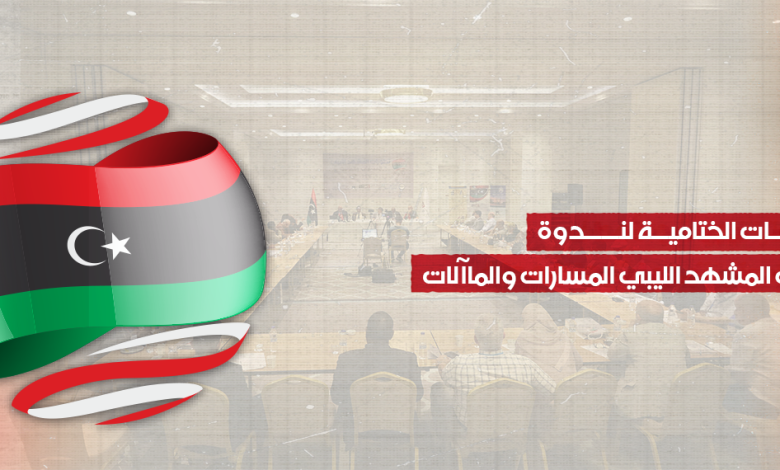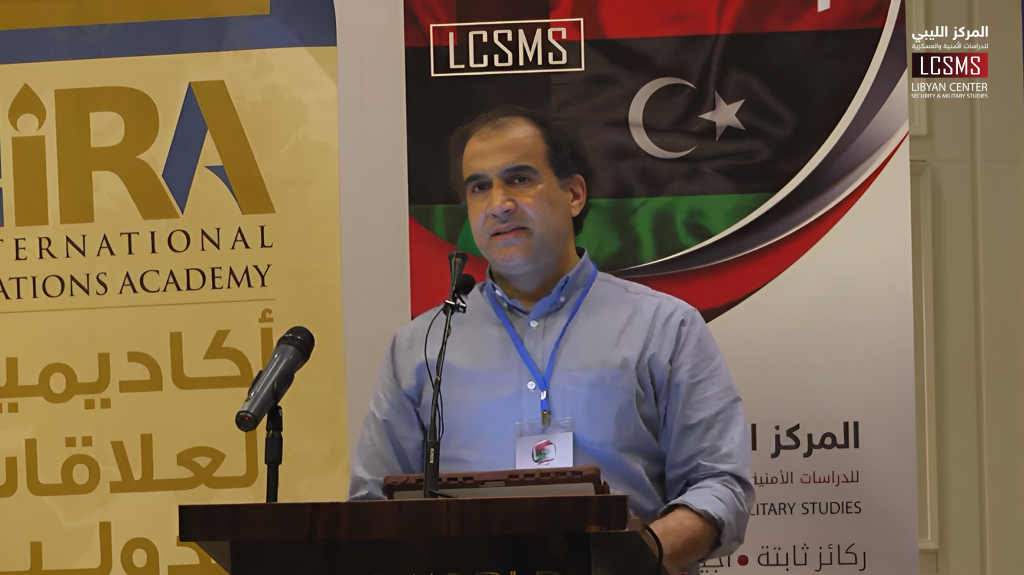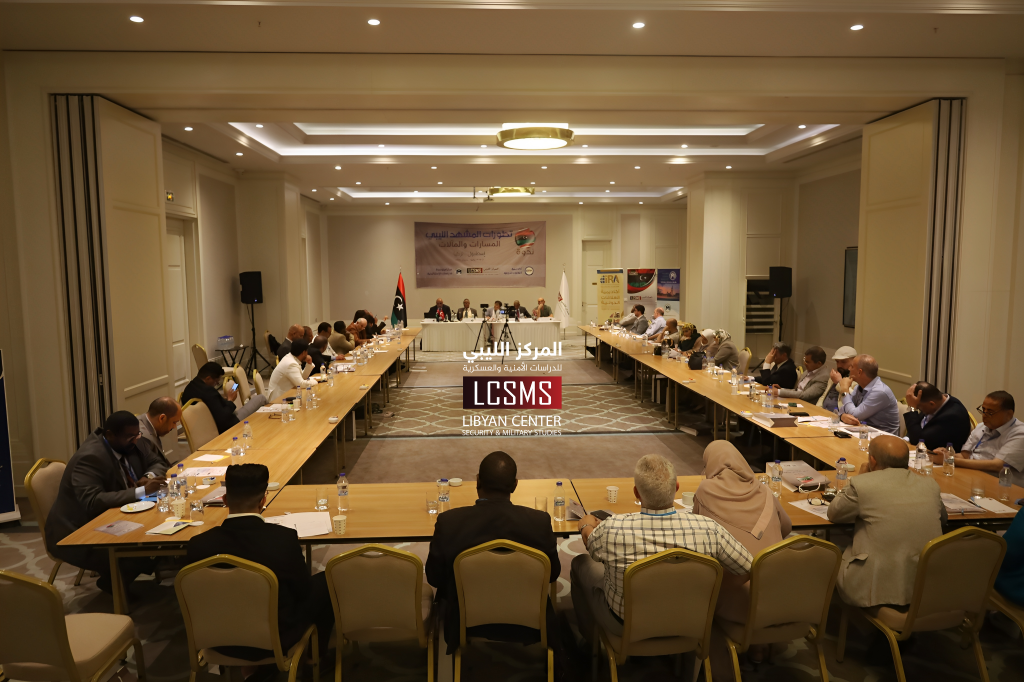Seminar on developments in the Libyan scene held in the period 17 \ 18 / 19 June 2023 Final recommendations


The seminar aimed to describe the dynamics of the internal political scene, security and military, and the current Libyan economist, Identifying the elements controlling the interactions of the Libyan scene whose degree of power is contested from one stage to another, And the factors that continue to fuel the trends of contradiction and collision between the Libyan forces and actors, And also identify the main Libyan and non-Libyan forces affecting the crisis, and how the regional and international environments affect the map of power and interactions in Libya, and the stakes and priorities of the Libyan parties in light of the escalating external polarization, And finally determine the future directions of the crisis, With the aim of shedding light on the nature of the Libyan crisis and its current dimensions in a more profound and comprehensive way.
In order to benefit from the outcomes of the symposium at the practical and practical levels, We sent invitations to write policy papers and position estimates from experts and specialists in Libyan affairs to participate in person in Istanbul, Turkey, on the first and second day of the symposium. We also opened the field of participation for academics and researchers interested in Libyan affairs to participate in the third day, Remotely via zoom technology.
More than 36 researchers, experts and specialists in Libyan affairs participated in the symposium, and about 17 main commentators from various countries, Egypt, Chad, Sudan, Libya, Tunisia, Algeria, Morocco, Jordan, Lebanon, Syria, Iraq, France, Britain, America, etc. etc., with a total of 36 interventions delivered over three days, divided into 11 basic sessions.
On the first day of the seminar, we dealt with the reality of the current Libyan domestic scene, Starting with the political scene in the first session, Then the security and military scene in the second session, And then the economic scene in the third session.

On the second day of the symposium, We touched on the regional and international dimensions of the Libyan crisis, Beginning with regional policies towards the Libyan crisis in the first session, Then international policies in the second session, The last session was an open dialogue on the future trajectories of the crisis.
The third day included five basic sessions, The first session included the political dimensions of the internal Libyan scene, Then the economic dimensions in the second session, Then the regional repercussions of the Libyan crisis in the third session, International Politics and the Calculations of the Major Powers in the Fourth Session, Finally, the future trajectories of the crisis in the fifth session.
Based on the interventions made at the symposium and the comments of the commentators, The symposium concluded in its final statement with the following most important recommendations:
- Understand the mechanisms of functioning of political systems according to the context of international conflict science
- Finding appropriate solutions to the political situation as the main way out for the stability of the state and the final elimination of lawlessness, the most important of which are terrorism, the chaos of the proliferation of weapons, illegal immigration,… Etcetera.
- Adopting the upcoming Libyan elections as a starting point towards achieving national unity and national consensus and rearranging the Libyan interior, Solutions to prevent these elections from turning from a meeting point to a point that increases the space for divergence and disagreement.
- The participation of the international actors in supervising the progress and completion of the electoral process until the end of its cycles, to ensure its integrity and transparency, All the forces of the Libyan people are included in it.
- Accepting the results of the elections and respecting the will of the Libyan people, In the selection of its leadership, Avoid duplicating the will of the electorate and the outcome of the democratic process.
- Directing security policies towards building institutions with administrative control, and judicial.
- Building security institutions through the application of legal texts related to the security policies of security institutions, Until the operating system of the security system straightens.
- Work on the development of regulatory controls for security institutions to be a beacon for employees to guide heads and subordinates to reduce the personalization of the institution, And maintaining administrative collectivity, which promotes the idea of teamwork.
- Activating the Council of Ministers Resolution No. (131) of 2012, Establishment of the Academy of Security Sciences, Police members with higher degrees affiliated with the Academy’s colleges were granted the status of faculty members. And the formation of a higher scientific committee affiliated to the Academy concerned with scientific affairs as well as the functional affairs of faculty members.
- Activating the aviation police and border security to control and secure the state, and control cross-border crimes, such as smuggling crimes, illegal immigration, etc. Etcetera.
- Work to spread legal and security cultural awareness, And to spread the spirit of hope and reassurance among the youth, Being the segment that Libya is currently betting on for the advancement of the country, This is done through concerted efforts between all parties in the state.
- Adopting an organizational structure that focuses on security institutions with an administrative control function, and judicial; for the needs of the state in such circumstances for the guard post.
- Emphasizing the need to reach common convictions and a clear vision through in-depth dialogues between community and military actors, and the leaders of armed formations, To reach the development of a balanced security and defense theory capable of preserving the security and capabilities of the homeland and the Libyan citizen.
- Develop a strategic vision for political, economic and social inclusion in the near to medium term that addresses concerns about the division of power; Based on participatory dialogue with traditional and non-traditional actors, Some elements to consider include the distribution of the revolution, and the transition from a state-led economy to a private-sector-led economy, and diversification of economic activity.
- Libya needs to move from a centrally planned economy to strengthening the role of the private sector. From a hydrocarbon economy to a diversified economy it can absorb the available workforce into qualified jobs.
- The need to drive economic growth and support economic stability, Libya could benefit from modernizing and diversifying the structure of its economy away from near-total dependence on oil. Encouraging private sector development, and use it to promote job creation.
- The creation of Arab peacemaking and peace-keeping forces linked to the Arab National Security Council of the League of Arab States.
- Emphasizing that the continuation of regional and international interventions without coordination between national and external strategy may create a situation of asymmetric strategies, Research into the relationship between national, regional and international interests must therefore be intensified.
- Call on the Libyan parties to ensure the preservation of the unity of the country and to prevent its division along political, geographical and tribal lines, the immediate cessation of all hostilities, Stop the depletion of the state’s resources, Calling on neighboring countries and regional parties to stop supporting the parties to the Libyan crisis with weapons and equipment under the cover of training and military experts, And push for the success of political efforts.
Disclaimer: TheLibyan Center for Security and Military Studies confirms , However, it does not adopt any institutional orientations towards the political issues addressed, and that what is published only expresses the views of its authors, It does not necessarily reflect the Centre’s point of view.
To download the file, click here

